-
01-01-2018
El cuidado en la Atención Primaria de Salud: vivencia de las enfermeras
Revista Brasileira de Enfermagem. 2018;71:531-537
Abstract
El cuidado en la Atención Primaria de Salud: vivencia de las enfermeras
Revista Brasileira de Enfermagem. 2018;71:531-537
DOI 10.1590/0034-7167-2016-0244
Views0See moreRESUMEN
Objetivo:
comprender el significado de realizar cuidados de enfermería en la Atención Primaria de Salud desde la perspectiva de las enfermeras chilenas.
Método:
investigación cualitativa con enfoque desde la fenomenología social de Alfred Schütz. La recolección de datos fue realizada entre enero y abril del 2013, a través de entrevista con 13 enfermeras de Atención Primaria en Chile.
Resultados:
las enfermeras perciben el cuidado como una experiencia gratificante considerando un encuentro de subjetividades. Sin embargo, se sienten sobrecargadas por múltiples funciones a realizar y por presiones jerárquicas en el logro de las metas. Aspiran implementar cuidados innovadores manifiestados por el deseo de superar el cuidado tradicional y la eficiencia de la gestión de los diversos niveles de atención de la salud.
Conclusión:
es importante discutir estos resultados en el contexto de la asistencia y especialmente en la formación, con el fin de preparar mejor a las enfermeras que brindarán cuidados en este nivel de atención.
-
RESEARCH01-01-2018
Obstacles in the detection and reporting of tuberculosis cases: a discursive analysis
Revista Brasileira de Enfermagem. 2018;71:523-530
Abstract
RESEARCHObstacles in the detection and reporting of tuberculosis cases: a discursive analysis
Revista Brasileira de Enfermagem. 2018;71:523-530
DOI 10.1590/0034-7167-2016-0673
Views0See moreABSTRACT
Objective:
To analyze the discourses of health professionals about the obstacles in the process of detection and reporting of tuberculosis cases in Mozambique.
Method:
Qualitative exploratory study with a theoretical-methodological approach of Discourse Analysis of French matrix. The study was conducted in Mozambique in 2014 at three levels: central, provincial and district. The study included 15 health professionals, 4 physicians, 6 technicians and 5 nursing professionals, who worked in the National Tuberculosis Control Program, with more than 1 year of experience.
Result:
The following discursive blocks emerged: Detection of tuberculosis cases in laboratories; Underreporting of tuberculosis cases; Obstacles to detect cases of tuberculosis: long distances and lack of transport; and Reporting of cases for decision making.
Final considerations:
The discourses analyzed point to the ideological affiliation that includes the lack of investment policies in the health sector and the political commitment as basic obstacles in the detection and reporting of tuberculosis cases.
-
RESEARCH01-01-2018
Quality of life of elderly people living with HIV/AIDS in outpatient follow-up
Revista Brasileira de Enfermagem. 2018;71:513-522
Abstract
RESEARCHQuality of life of elderly people living with HIV/AIDS in outpatient follow-up
Revista Brasileira de Enfermagem. 2018;71:513-522
DOI 10.1590/0034-7167-2017-0127
Views0See moreABSTRACT
Objective:
To analyze factors related to the quality of life of elderly people living with HIV/AIDS.
Method:
A cross-sectional study was carried out with people aged 50 years or more in a specialized outpatient clinic. The data collection was by means of an interview. For the analysis of data and characterization of the sample, descriptive statistics and comparison tests were used. The project met the ethical requirements.
Results:
Participants were 81 users aged 50 to 75 years, mean age was 57.8 (± 6.1) years, 71.6% of whom were men. There was a statistically significant relationship with the quality of life, the following variables: gender, children, occupation, religion, diagnosis time, HIV exposure, adverse effects, treatment interruption, viral load counts, hospitalization, dependence for daily activities and use of drugs.
Conclusion:
The results suggest that the quality of life deficit is related not only to physical changes, but to the anguish and stigma related to HIV/AIDS.
-
RESEARCH01-01-2018
Alcohol consumption, Quality of Life and Brief Intervention among Nursing university students
Revista Brasileira de Enfermagem. 2018;71:505-512
Abstract
RESEARCHAlcohol consumption, Quality of Life and Brief Intervention among Nursing university students
Revista Brasileira de Enfermagem. 2018;71:505-512
DOI 10.1590/0034-7167-2017-0692
Views0See moreABSTRACT
Objective:
To evaluate nursing university students’ alcohol consumption patterns, Brief Intervention and Quality of Life (QoL).
Method:
This is a prospective and longitudinal study containing sociodemographic, economic information concerning alcoholic beverages, BI and QoL evaluation among 281 nursing university students. Since surveys have been applied, seminars have been given and consumption patterns have been discussed, an educational material was delivered after university students’ revaluation and BI reinforcement. Descriptive and analytical statistics have been conducted.
Results:
90% of the students have already consumed alcohol and 20.6% that consumed for the first time and abused alcohol were minors. After the implementation of BI, the alcohol consumption has decreased among university students. Besides the vitality, generate state of health, and emotional aspects have decreased, mental health was substantially low among the students that used to drink.
Conclusion:
BI contributes to decrease alcoholic beverages consumption and promotes health.
-
RESEARCH01-01-2018
Reflections and collective production about being a municipal health counselor
Revista Brasileira de Enfermagem. 2018;71:496-504
Abstract
RESEARCHReflections and collective production about being a municipal health counselor
Revista Brasileira de Enfermagem. 2018;71:496-504
DOI 10.1590/0034-7167-2017-0369
Views0See moreABSTRACT
Objective:
to identify the participation dynamics of a municipal council and to develop a critical-reflexive process on “being a counselor”, identifying weaknesses and possibilities of this council, in addition to collectively generating new knowledge and (re)elaborating the MHC Ordinary Law.
Method:
Convergent care research, including documentary analysis, non-participant observation and thematic workshops. The research was carried out in 2016, with municipal health counselors from a city in the Western Region of Santa Catarina.
Results:
this study made it possible to identify forms of social participation that should be strengthened in the performance of social power, to reflect and share individual experiences, to anchor them in the current legislation, and to build knowledge that enabled the elaboration/organization of a product – a new text for the Ordinary Law of the Council, adjusted to current legislation.
Final considerations:
There is a need to increase participation, considering the presence of the counselors in the meetings, the effective representation and a greater interaction in the discussions and deliberations of the council.
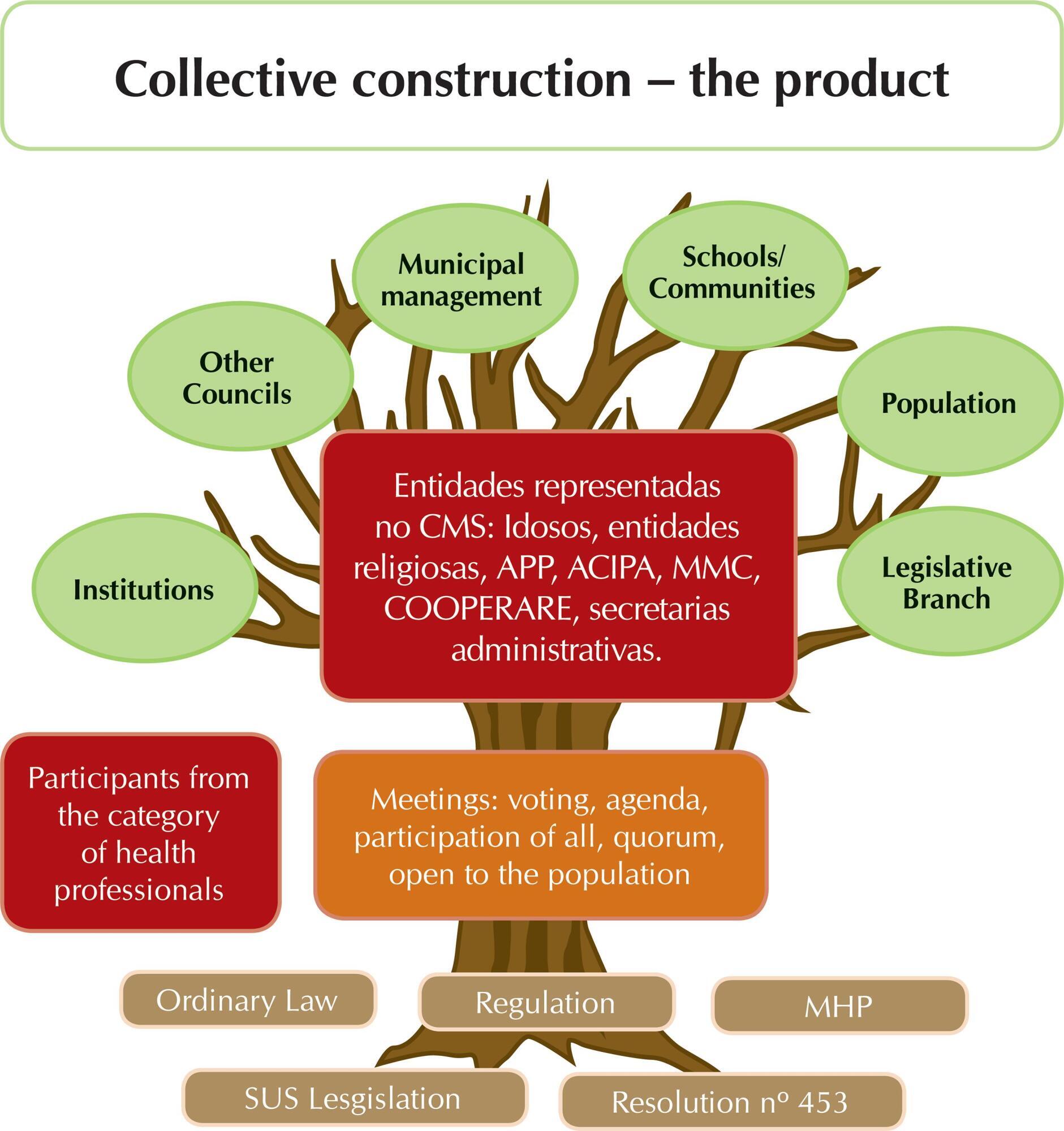
-
RESEARCH01-01-2018
Social network: evaluation of the support or containment contexts of lesbian mothers
Revista Brasileira de Enfermagem. 2018;71:490-495
Abstract
RESEARCHSocial network: evaluation of the support or containment contexts of lesbian mothers
Revista Brasileira de Enfermagem. 2018;71:490-495
DOI 10.1590/0034-7167-2017-0419
Views0See moreABSTRACT
Objective:
To evaluate the social network of lesbian mothers, from the social contexts of support or restraint.
Method:
Descriptive, exploratory study, of qualitative approach, based on the theoretical reference of Social Network, with eight lesbian mothers selected through Snowball technique, using semi-structured interview. Data analysis was performed with IRAMUTEQ software, through Similarity Analysis.
Results:
The social network is configured as: 1) Emotional distance and non-acceptance of motherhood by the family members – primary network elements; 2) Interference in the socio-cultural medium for the effectiveness of the mother-child bond – secondary network elements.
Final considerations:
Social network is grounded on trivialized and negative conceptions that highlight prejudice and disrespect. The discussion of this theme contributes to a greater visibility of those new family arrangements as well as to reduce stigmas e prejudices that pervade the social network components of these women.
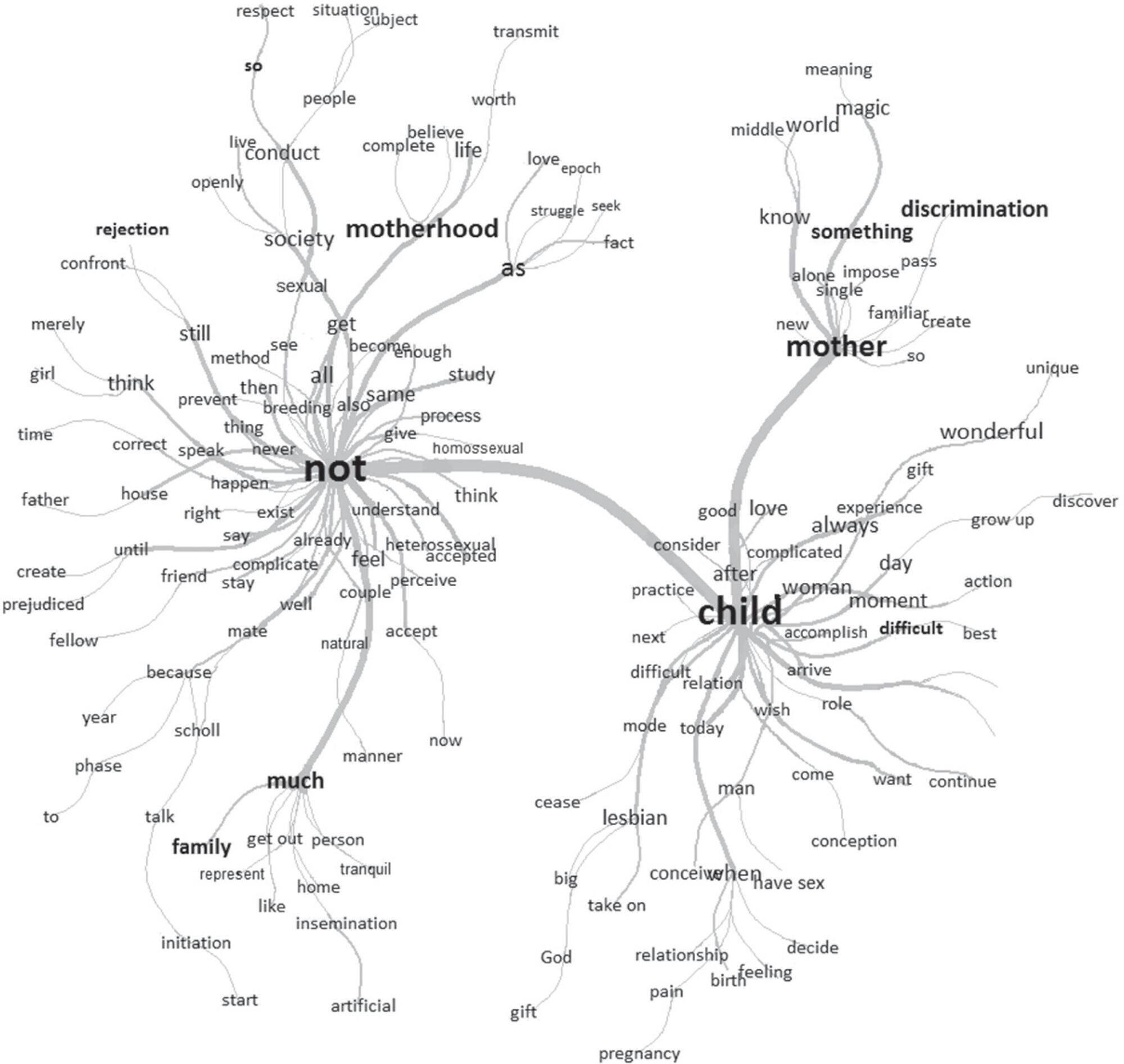
-
RESEARCH01-01-2018
Wellness room as a strategy to reduce occupational stress: quasi-experimental study
Revista Brasileira de Enfermagem. 2018;71:483-489
Abstract
RESEARCHWellness room as a strategy to reduce occupational stress: quasi-experimental study
Revista Brasileira de Enfermagem. 2018;71:483-489
DOI 10.1590/0034-7167-2017-0572
Views0See moreABSTRACT
Objective:
To compare occupational stress levels of nurse staff working in the surgical unit before and after the intervention “wellness room”.
Method:
Quasi-experimental study with a sample of 60 nurse staff working in a surgical unit of a teaching hospital in the Southern Region of Brazil. The intervention was conducted in a room in the workplace for six months and consisted of sections of aesthetic care, relaxation, lectures and workshops to reduce occupational stress. Data were collected through the Demand-Control-Support Questionnaire before and after the intervention, and the comparative analysis was performed by the Wilcoxon test.
Results:
After the intervention, there was a decrease in demand and an increase in control and in the social support received at work in all professional categories, but the differences were not statistically significant.
Conclusion:
The intervention “wellness room” reduced occupational stress levels in the sample studied; however, it was not a significant decrease.
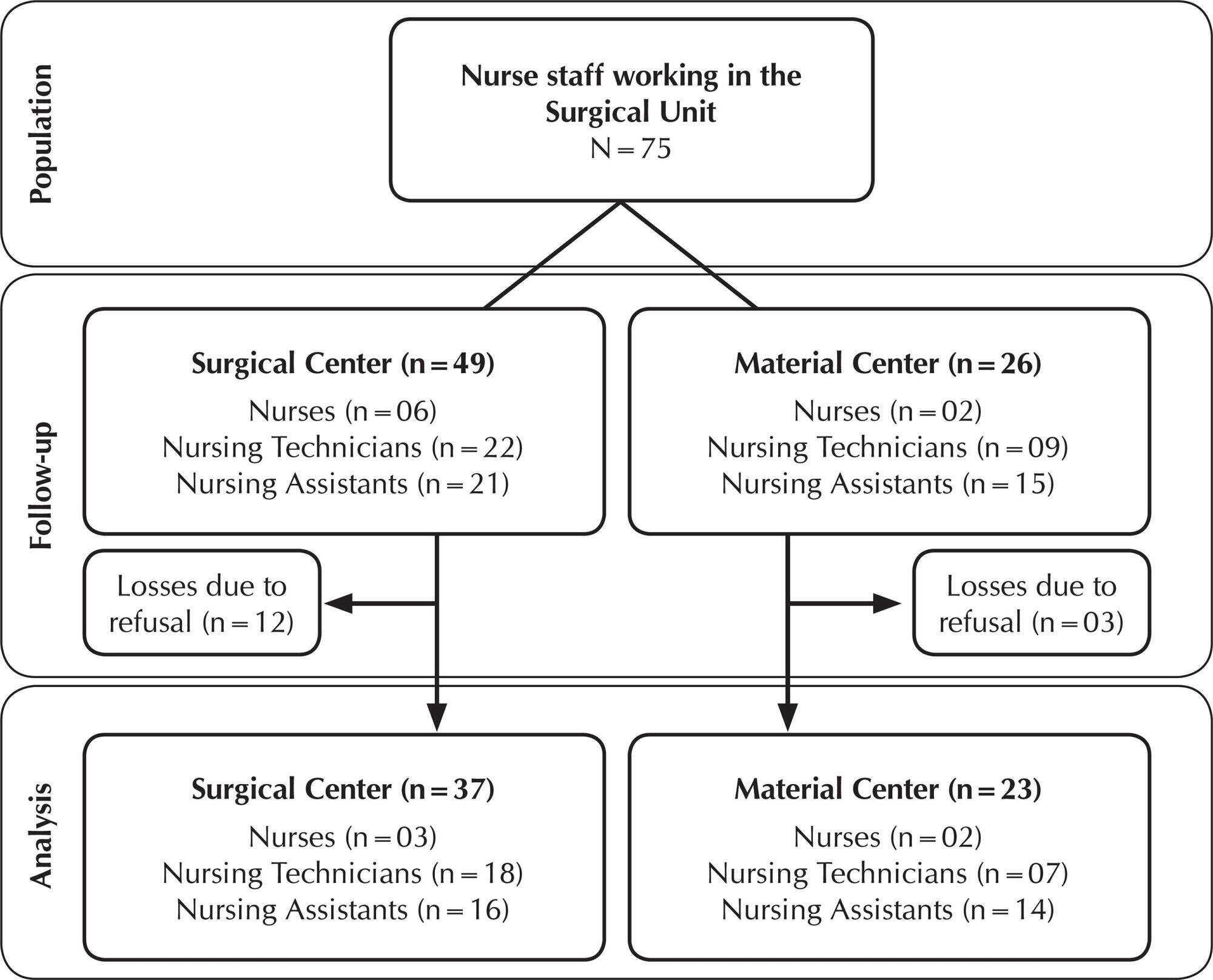
-
RESEARCH01-01-2018
Characterization of users at risk of developing diabetes: a cross-sectional study
Revista Brasileira de Enfermagem. 2018;71:475-482
Abstract
RESEARCHCharacterization of users at risk of developing diabetes: a cross-sectional study
Revista Brasileira de Enfermagem. 2018;71:475-482
DOI 10.1590/0034-7167-2017-0776
Views0See moreABSTRACT
Objective:
To characterize the profile of users at risk of developing diabetes mellitus type 2 according to sociodemographic and clinical variables.
Method:
Cross-sectional study, descriptive, quantitative approach conducted with 266 users of Basic Care. Inferential statistics analysis, calculating the crude prevalence ratio with confidence interval of 95% and Kruskal-Wallis test, and application of the multivariate technique simple Correspondence Analysis.
Results:
It was noted that 83.1% were women and 36.4% frequented the Family Health Unit from 1 to 5 years. Regarding the factors associated with diabetes mellitus type 2, 66.5% of the users were overweight and 77.9% were rated with central obesity. The great majority, 77.4%, did not practice physical activities and 21.1% had altered glycemia.
Conclusion:
The results showed that many risk factors for developing diabetes mellitus type 2 were among the population of the study.
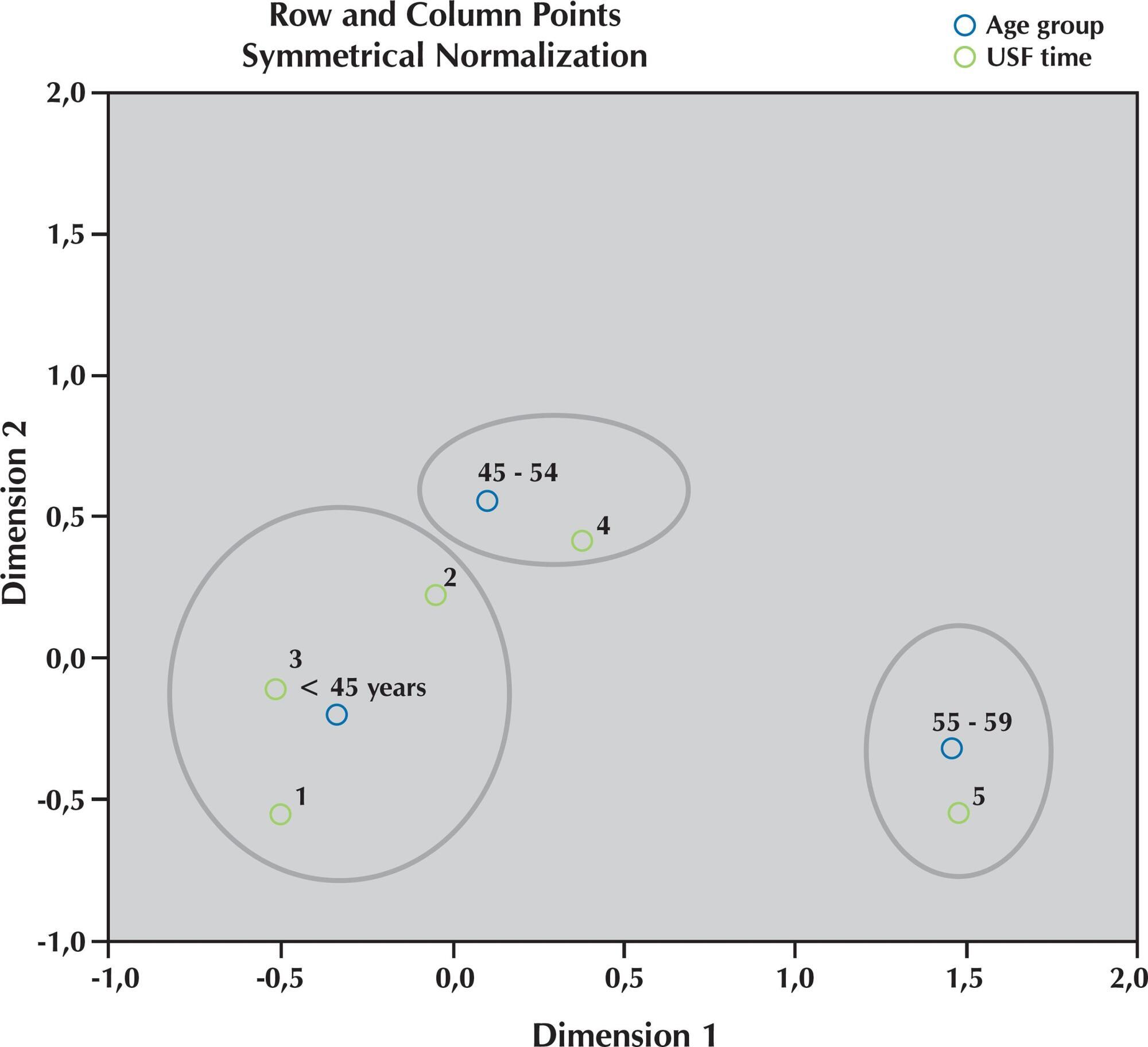
-
ORIGINAL ARTICLE03-30-2020
Team-Based Learning: a randomized clinical trial in undergraduate nursing
Revista Brasileira de Enfermagem. 2020;73(2):e20180621
Abstract
ORIGINAL ARTICLETeam-Based Learning: a randomized clinical trial in undergraduate nursing
Revista Brasileira de Enfermagem. 2020;73(2):e20180621
DOI 10.1590/0034-7167-2018-0621
Views0See moreABSTRACT
Objectives:
To compare the knowledge on surgical safety through the team-based learning methodology and lecture classes for undergraduate Nursing students, and evaluate the learning satisfaction with team-based learning.
Methods:
Randomized, controlled, parallel, two-arm, unblinded clinical trial developed in the Faculty of Medicine of a public university in Botucatu, Brazil. The groups included 14 students for team-based learning and 11 students for lecture classes.
Results:
Students’ apprehension of knowledge in the team-based learning group was significantly higher compared to the control group (p<0.002) by considering the pre-test results. After 30 days, there was no significant difference between groups. The experience with the methodology was considered positive among students.
Conclusions:
Team-based learning is an important pedagogic tool available and has proven effective in education and learning with students playing the role of protagonists.

-
04-14-2021
Factors associated with anxiety in multiprofessional health care residents during the COVID-19 pandemic
Revista Brasileira de Enfermagem. 2021;74:e20200961
Abstract
Factors associated with anxiety in multiprofessional health care residents during the COVID-19 pandemic
Revista Brasileira de Enfermagem. 2021;74:e20200961
DOI 10.1590/0034-7167-2020-0961
Views0See moreABSTRACT
Objective:
To estimate the prevalence and factors associated with anxiety among multiprofessional health residents during the COVID-19 pandemic.
Methods:
Cross-sectional study, conducted in July 2020 with multiprofessional health residents (n = 67) from a university hospital. We used the Beck Anxiety Inventory to assess anxiety. Analyzing data through the chi-square test, likelihood ratio, and multiple analysis using Poisson regression with robust variance.
Results:
The proportion of moderate/severe anxiety was 31.3%, which showed significant association with working in sectors involving COVID-19 and directly with suspected/confirmed cases of COVID-19. During the multiple analysis, we found prevalence of anxiety in participants who needed psychological support after entering their residence and those who used psychotropic meds.
Conclusion:
The results seem to indicate that residents had their mental health impaired during the pandemic, but the maintenance of the variables in the model also suggests that they sought help to control anxiety.
-
REVIEW12-13-2019
The use of children’s stories in nursing care for the child: an integrative review
Revista Brasileira de Enfermagem. 2019;72:333-342
Abstract
REVIEWThe use of children’s stories in nursing care for the child: an integrative review
Revista Brasileira de Enfermagem. 2019;72:333-342
DOI 10.1590/0034-7167-2018-0456
Views0See moreABSTRACT
Objective:
To identify how children’s stories can be used in child care.
Method:
Integrative literature review, conducted in databases between 2000 and 2018, in three languages. Full research articles were included that agreed with the following question: “How can children’s stories be used in child care?”.
Results:
From the analysis of 16 selected articles, three categories emerged: The use of stories in the hospital; Specialized nursing intervention; and Stories in the educational dimension.
Final considerations:
Evidence shows benefits to children, families, institutions and nursing. The use of children’s stories as a care intervention can occur in different situations and settings, values; boosts bonds, reduces anxiety in children and families, encourages children’s participation in care, and promotes health education. It is a low-cost and still incipient strategy in nursing.
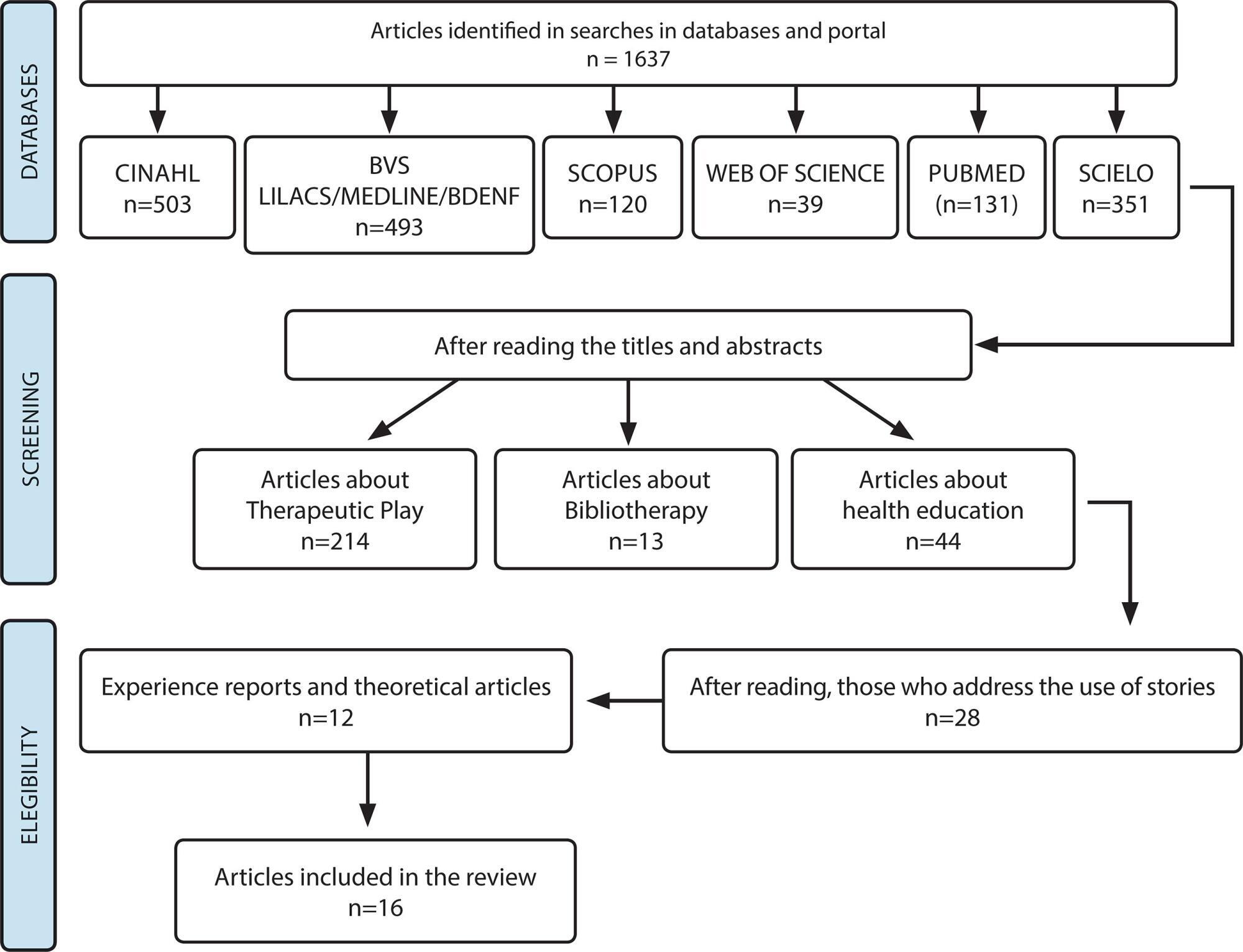
-
REVIEW12-13-2019
Interfaces of vulnerability dimensions in violence against children
Revista Brasileira de Enfermagem. 2019;72:343-347
Abstract
REVIEWInterfaces of vulnerability dimensions in violence against children
Revista Brasileira de Enfermagem. 2019;72:343-347
DOI 10.1590/0034-7167-2018-0463
Views0See moreABSTRACT
Objective:
present and discuss the potential use of the concept of vulnerability for the development of practices to address violence against children.
Method:
this is a theoretical study that presents the characteristics of the phenomenon of violence against children, to which the concept of vulnerability is applied.
Results:
proposal of a framework for the analysis of violence against children in the perspective of vulnerability, creating individual and collective dimensions. Violence against children, when analyzed in the perspective of this concept, broadens the understanding of this phenomenon, as it exposes aspects and conditions from outside the family that are co-responsible for the occurrence of this phenomenon.
Conclusion:
developing studies to identify the vulnerability of children to violence is essential for the development of practices to address this issue.
-
ORIGINAL ARTICLE02-10-2020
Nursing practices in a psychological care center
Revista Brasileira de Enfermagem. 2020;73(1):e20180175
Abstract
ORIGINAL ARTICLENursing practices in a psychological care center
Revista Brasileira de Enfermagem. 2020;73(1):e20180175
DOI 10.1590/0034-7167-2018-0175
Views0See moreABSTRACT
Objective:
To analyze the practices developed by nursing professionals in a Psychosocial Care Center (CAPS).
Method:
A qualitative and evaluative research based on the Fourth Generation Assessment and conducted in a CAPS II of Santa Catarina State in 2014. For data collection, semi-structured interviews, field observation, and data recycling group were used with workers. Constant Comparative Method was used for data analysis.
Results:
Practices aimed at the subject and their clinical, social, prevention, treatment and articulation with the health network were identified. Medication care is a specificity of nursing that aims to promote autonomy and social reintegration. There is a need for greater articulation between the nursing and pharmacy staff, as well as creating spaces for users to talk about medication.
Conclusion:
Nursing practices are focused on biopsychosocial care, aiming to deconstruct care models focused on the disease and symptoms.
-
REFLECTION02-05-2021
Empathic listening: welcoming strategy for nursing Professional in coping with with the coronavirus pandemic
Revista Brasileira de Enfermagem. 2021;74:e20200721
Abstract
REFLECTIONEmpathic listening: welcoming strategy for nursing Professional in coping with with the coronavirus pandemic
Revista Brasileira de Enfermagem. 2021;74:e20200721
DOI 10.1590/0034-7167-2020-0721
Views0See moreABSTRACT
Objective:
to reflect on empathic listening use as a welcoming strategy for nursing professionals to cope with the challenges during the pandemic caused by the new coronavirus.
Methods:
this is a reflection study based on updated data surveys and theoretical-conceptual aspects of Non-Violent Communication and empathic listening.
Results:
in the performance during the COVID-19 pandemic, nursing professionals are exposed to violence of different natures related to occupational stress, work overload, anguishes and silenced suffering, with implications for the workers’ health, who can be benefited and strengthened with empathetic listening.
Final considerations:
the health crisis has highlighted the weaknesses of the health system. Nursing acts as the largest contingent of the health workforce in coping with the pandemic. Empathetic listening is a powerful strategy in caring for and strengthening nursing professionals.
-
ORIGINAL ARTICLE02-25-2022
Factors associated with stress, anxiety and depression in nursing professionals in the hospital context
Revista Brasileira de Enfermagem. 2022;75:e20210263
Abstract
ORIGINAL ARTICLEFactors associated with stress, anxiety and depression in nursing professionals in the hospital context
Revista Brasileira de Enfermagem. 2022;75:e20210263
DOI 10.1590/0034-7167-2021-0263
Views0See moreABSTRACT
Objective:
to determine the factors associated with stress, anxiety and depression, concomitantly, in nursing professionals who work in the hospital context.
Methods:
a quantitative and cross-sectional study with 353 nursing professionals from a hospital. A sociodemographic questionnaire and the Depression, Anxiety and Stress Scale-21 were used. Data were subjected to descriptive statistical analysis, difference and correlation tests.
Results:
the main factors associated with stress, anxiety and depression, concomitantly, were being female, compromised family and social support, lack of autonomy at work, hostile relationship with colleagues, lack of professional recognition and satisfaction, feeling of being overwhelmed and insecurity.
Conclusions:
demographic, physiological, social and work factors impact the levels of stress, anxiety and depression in nursing professionals. The adoption of coping strategies for modifiable factors should be considered, in order to provide better quality of life for these professionals.
-
08-10-2020
Repercussions of intestinal ostomy on male sexuality: an integrative review
Revista Brasileira de Enfermagem. 2020;73(6):e20190245
Abstract
Repercussions of intestinal ostomy on male sexuality: an integrative review
Revista Brasileira de Enfermagem. 2020;73(6):e20190245
DOI 10.1590/0034-7167-2019-0245
Views2INTRODUCTIONThe intestinal ostomy, also known as stoma and ostomy, consists of an artificial opening, produced surgically, whose purpose is to divert the flow of effluents to the external environment. Such a condition can impact the lives of affected individuals due to transformations that affect human multi-dimensionality, including negative repercussions involving sexuality(–).In the United States of […]See more
Search
Search in:
Nuvem de Tags
Adolescente (85) Atenção Primária à Saúde (239) COVID-19 (91) Criança (91) Cuidados de Enfermagem (269) Educação em Enfermagem (151) Educação em Saúde (139) Enfermagem (930) Enfermagem Pediátrica (86) Estudantes de Enfermagem (77) Estudos de Validação (131) Família (87) Idoso (208) Promoção da Saúde (99) Qualidade de Vida (104) Saúde do Trabalhador (86) Saúde Mental (145) Saúde Pública (82) Segurança do Paciente (150) Tecnologia Educacional (100)



